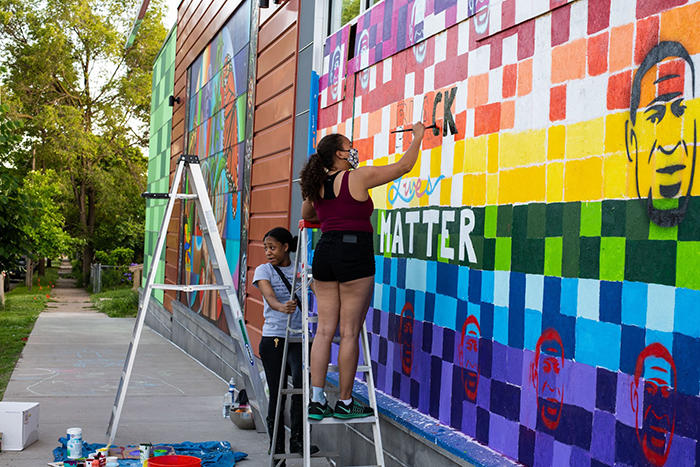
In this issue of Co-op Weekly, we are taking time to reflect on the journey that the cooperative community has taken over the past year toward building a more equitable, just society. As we look at the broader co-op community, we think it is right that we also be transparent about NCBA CLUSA’s journey.
To make real change, we know we need to acknowledge the failings of the past. While the cooperative values and principles promise more equitable and just businesses, people have not always used co-ops to these higher ends. While co-ops put people at the center of the business, these people are still prone to the biases and abuses of their surrounding culture—biases and abuses that can find expression in the co-op itself. In the cooperative community, these systemic failings can result in choices about who can effectively be a member, or who has opportunity to serve on the board and influence the co-op’s strategy. They can mean that certain staff have more opportunity than others, or that the co-op fails to reach out to less visible or unfamiliar parts of their community.
To help the cooperative community grow on this journey, we have worked on both external and internal strategies.
Our work within the cooperative community
We embarked on a scope of work with the Robert Wood Johnson Foundation to accelerate DEI in the cooperative community that includes:
- a cross-sector survey on Diversity, Equity and Inclusion Trends in the Cooperative Community as expressed in governance and its impact on member communities, the results of which will come out in August
- a curriculum-driven DEI Peer Learning Cohort engaged in a 10-month workshop with the goal of developing a group of cooperative DEI leaders who can accelerate effective DEI strategies for their own co-op and local cooperative communities
We advocated for a raft of policies that support Black, Native American and Latinx communities, including: support for socially disadvantaged farmers, ranchers and their communities in the American Rescue Plan, including through investments in cooperative development; continued advocacy for cooperatives to create greater opportunities in sectors predominantly led by marginalized people, particularly home care; advocating for infrastructure policy that creates more ownership and wealth-building opportunities in all sectors, specifically housing and energy infrastructure.
In August we will co-host a webinar series on transforming Native American agriculture through cooperatives in partnership with the Native American Agriculture Fund (NAAF) and the Cooperative Development Foundation (CDF). “Cooperating to Enhance Native American Food Economies” will explore the need to harness Indian Country’s economic and nutritional potential to recover from COVID-19 and propel sustainable rural economic development. It will also address food hubs and cooperatives, opportunities and challenges for cooperatives in Indian Country, and imagining a cooperative Native food system.
We helped defend and grow the U.S. Department of Agriculture’s Rural Energy Savings Program to ensure that the 21st century energy opportunities equitably reach rural Americans, many of whom are from Black, Latinx or Native American households.
We continue work with the International Cooperative Alliance on increasing the importance of DEI in the cooperative identity. In October 2019, NCBA CLUSA’s Board of Directors adopted a resolution for leadership to work to ensure that diversity, equity and inclusion are better expressed and understood within the cooperative identity. Since then, NCBA CLUSA’s board and staff leadership have worked with the leadership at ICA to secure this topic within the agenda of the 2021 World Cooperative Congress in December under the theme of “Deepening our Cooperative Identity.”
The Board Nominating Committee has been working on a set of recommendations to change policy and processes that would improve the Board’s representation so that it would be more inclusive of the cooperative community. The board will take up the policies at its June 2021 meeting.
Our work within NCBA CLUSA
While we have worked with our members, board and policymakers to deepen and accelerate diversity, equity and inclusion, we have also focused on NCBA CLUSA’s internal culture and staff. The shock and trauma of the summer of 2020 has given way to greater awareness and strategies to improve the internal culture and processes at NCBA CLUSA. The work to ensure that NCBA CLUSA is inclusive does not have a precise start date. Like so many co-ops and associations, this work is part of our DNA. That said, at the beginning of 2019, we had determined that we would channel our organizational energy into improving the culture of our association to ensure everyone felt respected and had an opportunity to contribute to NCBA CLUSA’s vision. Later that year, a number of our staff came forward with a courageous message to leadership that made plain their observations that NCBA CLUSA was not living up to its values and principles in ensuring an inclusive, respectful environment.
We then embarked on a journey with an outside consultant to complete an assessment of our practices and data around diversity, equity and inclusion that included a set of recommendations for improving diversity, equity and inclusion at NCBA CLUSA in three critical areas: people, systems and culture. We established a DEI Committee made up of staff with one representative from the Senior Leadership Team serving as a liaison. This committee was in the early stages of creating a strategy to implement the recommendations from the outside consultant exactly one year ago.
Then on May 25, 2020 and the days that followed, the NCBA CLUSA team experienced the trauma of witnessing the murder of George Floyd and the unavoidable nexus to continued systemic racism in the U.S. Our entire staff came together to support each other and to share perspectives of how systemic racism has impacted them personally. Some examples of our internal work since then includes:
- diversified our recruitment platforms and introduced more fairness and transparency to our hiring practices
- conducted mandatory training on Diversology and building an inclusive culture for all staff
- hired a new member of HR with expertise in DEI
- began our work to retain current talent by conducting a Stay Survey of NCBA CLUSA employees designed to gauge workplace climate and job satisfaction
- launched a staff newsletter and a series of virtual coffee breaks—both designed to create a shared space for meaningful conversations and thoughtful reflection around diversity, equity and inclusion topics.
While we are proud of the progress we have made, we know that this is only the beginning of this journey. The last year spurred a great deal of awareness on the existence and impact of systemic racism. We have also seen many entities—NCBA CLUSA included—say good things about their intention to take actions to create a more diverse, equitable, and inclusive country and world. We have even seen some initial actions that are laudable and inspiring. Yet the real work lies ahead as NCBA CLUSA and the cooperative community take actions to create an environment that combats systemic racism. This work may not be comfortable or easy, but it is absolutely necessary if we seek to realize our vision of building a more inclusive economy.
—Doug O’Brien is president and CEO of NCBA CLUSA, where he works with the cooperative community to deepen its impact on the economy.


